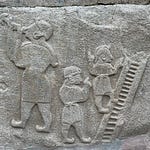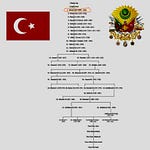As some of you might remember, I studied law. I worked as a property lawyer in London for a little while. One of the features in English law is this idea that sometimes, for whatever reason, commercial property is let at a peppercorn rent. Generally speaking, in this day and age, no peppercorn passes between the landlord and the person who’s leasing the property. It’s in all the leases. So that was always just a little curiosity to me, as indeed was the fact in contract law, in English and in American contract law, for there to be a contract to take place, there needs to be an agreement. There also needs to be what they call Consideration. If I contract with you, James, to buy 12 widgets, you have to, for the contract to be valid, you have to in some way pay me a deposit. This is the importance of the deposit.
So there’s this reciprocity. I was very interested in this book, which I read a couple of years ago by Marcel Mauss, who is one of the, you know, in every academic discipline, there’s always a few founders who are in every, in the first paragraph in every book. When you look at the laws of Sympathetic Magic, Marcel Mauss is right there.
That’s how I knew I was kind of, this is an interesting area to be in. I noted when I was reading this seminal text that some of you might have read as well called The Gift, by Marcel Mauss is he talked about early Germanic law and early Germanic contract law, which is from... which probably actually then becomes part of English law, even though English law says it’s coming from Roman law, which is a distinct Indo-European tradition from the italic as distinct from from the Germanic but in Germanic law each contract, sale or purchase, loan or deposit entails a pledge.
“One partner is given an object, generally something of little value like a glove or a piece of money, a knife or perhaps as with the French a pin or two. This pledge is in fact imbued,” this is Mauss writing, “this pledge is imbued with the personality of the partner who gave it. And the fact that it’s in the hands of the recipient moves its donor to fill his part of the contract or her part and buy themselves back by buying the thing.”
So when I saw this, I was like, ah, that’s interesting.
What’s going on is if I’m, if James is letting me rent his property, his skyscraper in Manhattan at a peppercorn rent, I give him this peppercorn. Actually in that peppercorn is my energy, it’s my Mana. It’s my personality. I’ve obviously got his because I’m in the I’m in the block itself.
What the whole gift is about and Mauss’s book is about is he’s looking at various different cultures and the exchange that in many different cultures, especially in Ameri-Indian cultures where early examples come from this potlatch, which is this institution of a meal, a communal meal, where you’re being hosted or you’re hosting your child’s getting married. You have to host the whole village. You give them food and drink and stuff like that. That interested me because in a lot of Irish mythological texts are about these big feasts. I always wondered what’s going on here.
It appears as if there is this idea of when you eat, when you partake of the feast, you’re taking something into you. So this is this idea of your energy, your Mana is being affected by what is coming into your body. Just as it is what’s coming into your mind from memes and from disinformation.
Equally, of course, what you’re giving into other people’s minds. So this is a reason. So this is why in my X and Bluesky profiles I say ‘there is Mana,’ ‘Mana is permanent,’ and ‘Communicate positive Mana’ (note the M-N-sound in Communicate, Permanent, and, of course, Mana).
This is this idea that, and what the Russians are doing is communicating just such negative Maa and driving us all to driving us all nuts with it. So this meaning of... And then I discovered this, which I’ve written about in my other project (Finding Manuland/Power of Mana), which isn’t so directly relevant. But that there’s lots, there’s heaps of different names for what I call Mana and this phenomenon which many people have written about from the beginning.
I’m just applying it to Disinformation studies. That’s my contribution to contemporary culture. Why particular memes take hold. Become contagious and how to detect in particular innocuous artefacts of what I call Disinfolklore or stories to detect in them these three archetypes: Russia’s invincible, Russia’s undefeatable and Russia has the right to intervene in its neighbours of political destinies.
So you can see that energy, that Mana in billions of different stories and items of Disinfolklore being voiced by everyone from Biden to Bill to people who aren’t pro-Russian. I have too in the past. We hear it from our friends all the time about Russia as being invincible. Thankfully, what we’re seeing at the moment is this archetype, this transition, this change. I don’t think if Russia does manage to take Pokrovsk, this is not going to disrupt the change in archetypal identity that appears to be taking place in the minds of, if not Donald (because obviously we know he changes with the weather), but in the minds of everyone around Donald. People - someone said to me today - someone who like two years ago We’re always having intense discussions about Ukraine and he was always like, “oh, Russia, basically Russia’s invincible, nothing will happen.” Now today he’s arguing the opposite. That’s a really good indicator for me.
The different words we have for this in different cultures, in Chinese cultures, it’s called Chi. It’s Qi in Japanese culture, in Hindu, it’s called Prana (breath). It interests me. It’s not called Mana in Hindi culture now. In Hebrew culture, it’s called Ruach.
These are all varieties of what I call Mana.
The Police would talk about synchronicity. That’s what that album means, synchronicity. So teleama, libido. Freud talked about libido. Nous. Someone else talked about Nous. Aristotle or someone like that: Vis medicatrix naturae. So kind of a formative cause. Pneuma. Holy Spirit, Woden. Actually, in Germanic culture, interestingly.
So there is this, or X-energy. So there is this, a lot of different people have noticed what I call Mana. But obviously this was before the disinformation age. So they didn’t really apply it to memes. What we’re dealing with in our timelines or what is in the what is in the information space and in the minds of our leaders and our leadership and how they’re affected.
We, as those pro-Ukraine, people in the pro-Ukraine information space, we have such a history, an in-depth history of this up and down since February 24th 2022. Where we’ve watched all the world leaders go through these changes like from “we need to give Putin a climb down” to ‘would you like ketchup with your 250 4th generation Gripen fighter jets Ukraine.”
We’ve seen this evolution of ideas and changes in archetypes in people’s minds. I think that gives us an edge in terms of it gives us a huge data set. A huge learning set for our algorithms, which a lot of other people don’t have.
This idea that when we write something that other people read changes them. Likewise, what they write changes you. When you’re speaking to people.
So this is what I mean by I’m looking at this in a particular segment of how we spend each day or of our consciousness or in human history, in human culture, which is in disinformation and Disinfolklore is what I’m particularly interested in.
Its insights or what I see in it is it applies in all forms of communications. It’s deeply embedded into our language. This M-N- sound in communication, communal, communal feast,… The M-N- sound in there and in meaning.
It makes sense to me that this sound and the meaning and this idea of exchange and energy exchange was known and used by the first Indo-Europeans, the M-N- in Yamna as well, the first Indo-Europeans.
We’ve just kind of lost sight of it. It is embedded in the language. You don’t need to be interested in linguistics and what unites all native Indo-European language speakers between Ireland and India in terms of their mental frameworks to find this is a useful tool for parsing data.
There was a lot of work done in the 19th century when the Polynesians were discovered to have this concept of Mana. It’s important to know now a lot of the genetic… We know there was a lot of trade between India and Polynesia and between traders and Brahmin traders at the time. The people in the late 19th century didn’t really understand this that much. In fact, it’s really only becoming and I see stuff’s coming up in the last few months on looking at ancient DNA to try and work out the migration patterns in the Pacific.
The meaning of Mana in these tribes where, this is classic, 19th century stuff I’ll quote:
“the Melanesian mind is entirely possessed by the belief in a supernatural power or influence almost called almost universally Mana. This is what works to affect everything which is beyond the ordinary power of men. Outside of common processes of nature, it is present in the atmosphere of life.”
What I started today with to talk about magic, what I’m trying to do is decouple the idea of magic from something that is otherworldly to its initial and true meaning in our governance systems - Magistrate. Majesty. Magi. Magus. Magister as distinct from minister. The magister is the master and the minister ministrates to the master. We now have that in our governance discourse. When we talk about ministers this is part of the same semantic field and the same signifying field in Indo-European communities across the world as Magic.
Because of various cultural reasons, we associate magic with something that is otherworldly and that is the opposite of science. In fact, it’s intrinsic to the way we organize ourselves. as societies as Indo-Europeans. It’s quite useful when you then come across this discipline, this aspect to this cultural psychology, and you see the laws of sympathetic magic and you don’t think, oh, this is about, you know, some great, I can’t even think of any of those famous Hollywood illusionists. No, it’s not. It’s about an aspect of being human and exchanging - ‘sympathetic’ in this sense is about exchange. It’s about pathos, pathetic, exchanging feelings.
So when these 19th century, a lot of them were religious, they were missionaries South Seas. They encounter this concept of Mana. They’re amazed by it. They just think this is how the primitive mind works and over the course of thousands of years, we became more advanced than them.
That’s not that interesting to me. What is interesting to me is how fascinated this was the whole industry they were in this concept Mana. No one seemed to notice, even some of the greatest minds, that M-N-, the same sound, is in the language that they were talking about, Common. Men, Human.
They were really fascinated. There were various attempts then to connect this idea with Mana with early Roman religion, for instance, Numenism. Again, the M-N- in Numenism. There’s lots of fights over it. This is this idea that in early Roman religion, italic culture. You have a god. So this is an example I picked up from the deities protecting maternity (M-N-):
“You have the tumulus and sentinus have given him life and feeling. Opus, these are all deities. Opus takes him up from the bosom of the earth. Vaticanus opens his mouth for the first time. Levana lifts him off the ground. Cunina cares for him in the cradle. Potina and Aduca give him drink and food respectively.”
From the 19th century perspective, they’re looking at these pagan Romans having, like, gods for absolutely everything. There’s evidence that everything in the household - there is different household gods for every dimension of their lives. From our perspective, we look at these 19th century missionaries in as bizarre a way as we look at these Romans.
What I think is really the link with Disinformation studies is that when we’re looking at memes and these things which come alive in our minds, which come alive in our culture and then are transmitted, they are contagion. Rhey become the object of contagion. That this is really what we’re talking about. It’s the same thing. It’s the same phenomenon (m-n-) that the Romans (m-n-), the ancient, the early Romans. Then they consolidated everything into a few deities. Underneath them were just hundreds or thousands of deities. As there were with the Hittites and in other early religious cultures.
This is when we see life in memes and in certain things which take fire, which go viral. I think it’s a similar phenomenon. I think it’s the same thing really. What is common about it is Mana. There’s an energy in this rock. Or an energy in this God. Rhis deity that protects us or moves between us. I don’t mean protects us in a religious sense. I mean, actually, I don’t mean protect at all. But just that the energy moves between us.
So I’m trying to connect these old manifestations (m-n-) of ideas of energy running between people with what we’re dealing with in the information space. Equally what we’re dealing with in our normal lives when you’re feeling quite down and you bump into someone who just brightens your life. You bump into a child or it’s a cat or a dog or your friend or your friend who always makes you laugh. What you’re really doing there is exchanging energy.
I talked about it before from the biological sense that the mitochondria in our cells creates the energy. Now we know that they create all the energy which keeps us alive. That they transfer that energy between cells. So this model also has a biological um it’s a biological um uh correlate on it and uh that is really all i wanted to um that’s what i set out all of this now i finished now i set out to talk about four weeks ago.
Please also consider listening to /looking at the following series of podcasts which are part of my Disinfolklore project. There is a lot of complementarity to Power of Mana/Finding Manuland and Disinfolklore, no least in the use of Mana in Disinfolklore as a means of communicating the desirability of parsing memes for their many meanings:
Podcast | Jurisprudence of Sympathetic Magic’s Law of Similarity and Law of Contagion.
An introduction.
Podcast | Touching on Contagion in Disinfolklore
Final part of a series of four podcast applying Cultural Psychology’s cutting-edge work on the jurisprudence of Sympathetic Magic to Disinfolklore.
Magic as Propaganda Disguised in Disinfolklore
Why Mythology keeps popping up in Russian Disinfolklore
Podcast | Touching on Contagion in Disinfolklore
Final part of a series of four podcast applying Cultural Psychology’s cutting-edge work on the jurisprudence of Sympathetic Magic to Disinfolklore.
What Meaning Means
Meaning of identifying the meaning of the M-N sound - Most significant discovery in Indo-European linguistics since de Saussure?














